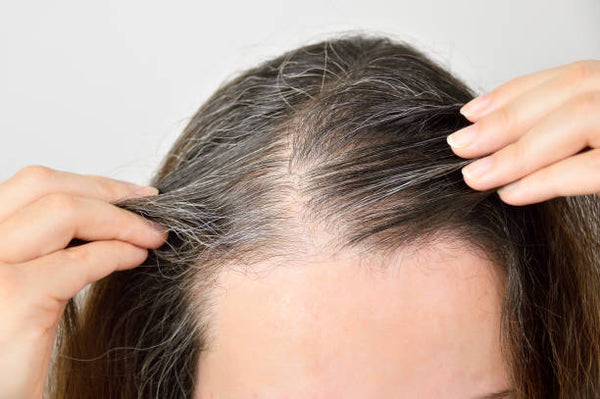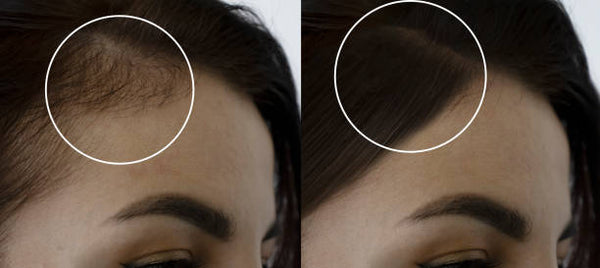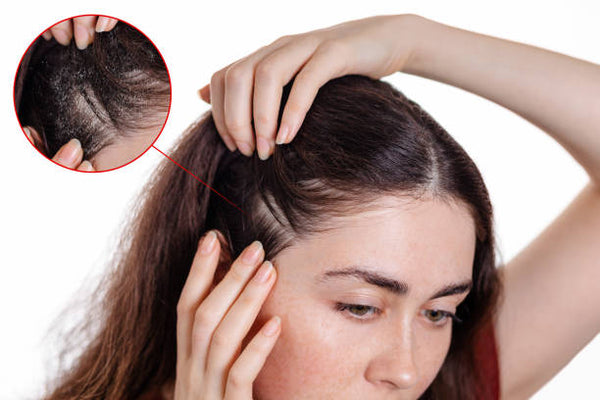The Effect of Aging-Related Melatonin Decline on Hair Pigmentation and Growth

As we age, our bodies undergo a series of changes that affect various systems, including our hair. One of the key factors influencing hair pigmentation and growth is melatonin, the hormone best known for regulating our sleep-wake cycles. However, melatonin also plays a critical role in maintaining hair health. In this blog, we’ll explore how the decline of melatonin levels as we age contributes to the graying of hair, as well as altered growth cycles, and what can be done to address these issues.

What Is Melatonin and How Does It Affect Hair?
Melatonin is a hormone primarily produced by the pineal gland in the brain. It regulates the body’s circadian rhythm, signaling to the body when it’s time to sleep and when to wake up. Interestingly, melatonin also affects various tissues and organs, including the hair follicles. It is thought to help maintain healthy hair by supporting the function of the hair follicles and regulating their growth cycles.
Melatonin's Role in Hair Pigmentation:
Melanin is the pigment responsible for the color of our hair, skin, and eyes. In hair follicles, melanin production is controlled by melanocytes, which are specialized cells that produce pigment. Melatonin influences the activity of these melanocytes. As melatonin levels naturally decline with age, the melanocytes become less efficient in producing melanin, leading to the gradual loss of hair color and the appearance of gray or white hair.
Melatonin's Role in Hair Growth:
In addition to pigmentation, melatonin also influences the growth cycle of hair. Our hair grows in cycles, consisting of three phases: anagen (growth), catagen (transitional), and telogen (resting). Melatonin is thought to have a positive effect on the anagen phase, promoting the growth and regeneration of hair. As melatonin levels decrease, the duration of the anagen phase can shorten, resulting in slower hair growth and potentially thinner hair over time.
How Aging Affects Melatonin Production
As we age, melatonin production naturally declines. This drop in melatonin levels is part of the broader aging process, with production starting to decrease significantly in our 30s and continuing to diminish as we reach our 60s and beyond. This reduction in melatonin has a direct impact on both hair pigmentation and hair growth.
1. Hair Graying:
Melanin production in the hair follicles is regulated by several factors, and one of these is melatonin. As melatonin levels drop, the melanocytes in the hair follicles produce less melanin. This reduction leads to the progressive loss of color in the hair, resulting in the characteristic gray or white hair associated with aging. Interestingly, some studies suggest that supplementing with melatonin may help slow down or even reverse this process, though more research is needed to confirm these findings.
2. Altered Hair Growth Cycles:
Aging affects the hair’s growth cycle, and melatonin plays a role in this change. With lower melatonin levels, the anagen phase shortens, and the hair enters the resting (telogen) phase earlier than before. This can result in thinner hair, more hair shedding, and slower hair regrowth after hair loss. Melatonin’s decline can also lead to a greater proportion of hairs in the shedding phase, contributing to the overall thinning of hair often observed in older adults.
The Science Behind Melatonin’s Decline and Hair Health
The direct relationship between melatonin and hair health is still being studied, but existing research highlights several key factors that may explain why melatonin’s decline impacts hair pigmentation and growth:
1. Melatonin as an Antioxidant:
Melatonin is a potent antioxidant, meaning it helps to neutralize free radicals in the body. Free radicals contribute to aging and damage to various tissues, including hair follicles. As melatonin levels decrease, the body’s ability to counteract oxidative stress diminishes, leading to increased damage to the hair follicles and melanocytes. This oxidative damage accelerates the graying process and can negatively affect hair growth.
2. Influence on Follicular Health:
Melatonin is believed to regulate the growth of hair follicles by controlling the expression of certain genes. As melatonin levels decrease, the health of the follicles may decline, leading to a shift in the hair growth cycle, which may cause hair to thin and shed more frequently. This explains why many people notice a combination of graying and thinning hair as they age.
3. Effects on Hormonal Balance:
Melatonin also has an impact on the balance of other hormones, such as cortisol and androgens. Hormonal changes related to aging can further exacerbate the effects of reduced melatonin levels on hair health, including increased shedding and slower regrowth.
Supporting Melatonin Levels to Combat Graying and Hair Thinning
While melatonin naturally declines with age, there are a few strategies that may help counteract its effects on hair pigmentation and growth:
1. Melatonin Supplements:
Some studies suggest that taking melatonin supplements could help improve hair health and slow the graying process. However, it’s important to note that these findings are not conclusive, and consulting a healthcare provider before starting any supplementation is recommended.
2. Topical Melatonin Treatments:
Topical melatonin treatments are becoming increasingly popular as a way to target hair growth and pigmentation directly at the hair follicles. While research in this area is still in its early stages, some preliminary studies have shown promise in melatonin’s ability to stimulate hair regrowth and delay graying when applied topically.
3. Antioxidant-Rich Diet:
Since melatonin also acts as an antioxidant, increasing your intake of foods rich in antioxidants may help combat oxidative stress in the body. Foods like berries, leafy greens, nuts, and seeds are great choices to protect hair follicles from damage.
4. Hair Care Products with Bond Repair Technology:
Using hair care products that promote bond repair and restore hair’s natural structure can help mitigate some of the effects of aging on hair health. Bond repair products strengthen the hair’s internal structure and can contribute to a fuller, healthier appearance, even as melatonin levels decline.
5. Stress Reduction:
Since melatonin plays a role in regulating stress and cortisol, adopting stress management practices like meditation, yoga, or deep breathing can help maintain balanced hormone levels, potentially reducing the impact of aging on hair health.
Final Thoughts
The aging-related decline in melatonin levels is a significant factor contributing to hair graying and altered growth cycles. While it’s a natural part of the aging process, understanding the role of melatonin in hair health can help us find ways to support our hair during this transition. By adopting a holistic approach that includes melatonin supplementation, antioxidant-rich diets, and bond-repairing hair care products, we can slow down the effects of aging on our hair and maintain healthier, more vibrant hair for longer.
FAQ
1. Can melatonin supplements really reverse gray hair?
While some studies suggest that melatonin may help delay or slow the graying process, there’s currently no conclusive evidence that it can reverse gray hair. More research is needed to confirm its effectiveness.
2. How long does it take to see results from melatonin treatments for hair?
Results can vary, but most people may start to see noticeable improvements in hair growth or pigmentation within 3 to 6 months of using melatonin-based treatments or supplements.
3. Are there side effects to using melatonin supplements for hair?
Melatonin supplements are generally considered safe when used appropriately, but side effects such as dizziness, daytime drowsiness, or headaches can occur. Always consult a healthcare professional before beginning any new supplementation.
4. Can stress management help with hair graying?
While stress management won’t directly reverse graying, it can help to maintain melatonin levels and reduce the impact of stress-related hair thinning or shedding. Practicing stress-relieving activities like yoga or meditation can contribute to overall hair health.
5. Can topical melatonin treatments be used alongside other hair care products?
Yes, topical melatonin treatments can generally be used alongside other hair care products, including bond-repair treatments. However, it’s important to test for any potential product interactions and consult a dermatologist if you have concerns.
By taking steps to support melatonin production and promoting healthy hair growth, you can maintain stronger, healthier hair as you age.




